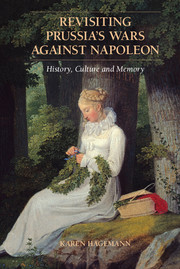Book contents
- Frontmatter
- Epigraph
- Contents
- List of Figures and Maps
- List of Abbreviations
- Acknowledgments
- Revisiting Prussia’s Wars against Napoleon
- Part One A History of Defeat, Crisis and Victory
- Part Two Discourses on the Nation, War and Gender
- Part Three Collective Practices of De/Mobilization and Commemoration
- Part Four Literary Market, History and War Memories
- Part Five Novels, Memory and Politics
- 15 Re-Creating the Past
- 16 Hopefulness and Disappointment
- 17 Critique, Desire and Glory
- Conclusion
- Epilogue Historicizing War and Memory, 2013–1813–1913
- Bibliography
- Name Index
- Subject Index
- Plate section
- References
16 - Hopefulness and Disappointment
Novels of the Restoration Era and the Vormärz
Published online by Cambridge University Press: 05 March 2015
- Frontmatter
- Epigraph
- Contents
- List of Figures and Maps
- List of Abbreviations
- Acknowledgments
- Revisiting Prussia’s Wars against Napoleon
- Part One A History of Defeat, Crisis and Victory
- Part Two Discourses on the Nation, War and Gender
- Part Three Collective Practices of De/Mobilization and Commemoration
- Part Four Literary Market, History and War Memories
- Part Five Novels, Memory and Politics
- 15 Re-Creating the Past
- 16 Hopefulness and Disappointment
- 17 Critique, Desire and Glory
- Conclusion
- Epilogue Historicizing War and Memory, 2013–1813–1913
- Bibliography
- Name Index
- Subject Index
- Plate section
- References
Summary
The publication of novels dealing with the years 1806–15, like memory production more generally, began immediately after the wars. Yet the proportion of novels of the recent past was still comparatively small when measured against total novel production in the period 1815–20; during the first five postwar years, no more than about 6 percent of all novels of the recent past addressed these wars. None of these early novels, whose most famous authors included Karl Gottlob Kramer, Caroline de la Motte Fouqué and Caroline Pichler, were reprinted frequently or entered the literary canon, but all of them were very popular among lending-library readers, and their authors were among the libraries’ most successful between 1815 and 1848. Kramer and Pichler retained this status until the end of the nineteenth century. With the exception of Ludwig Rellstab, the authors whose novels appeared from the 1820s to the 1840s did not achieve the large number of new editions and translations that some of the bestsellers in the second half of the century did. Writers such as Willibald Alexis, who began his career in the early 1820s, Friedrich de la Motte Fouqué and Karl Ludwig Häberlin, alias H. E R. Belani, were very well known among contemporary readers, as suggested by the borrowing records of the lending libraries. Their audience was socially far more circumscribed than in the second half of the century, though, consisting largely of the educated classes.
- Type
- Chapter
- Information
- Revisiting Prussia's Wars against NapoleonHistory, Culture, and Memory, pp. 354 - 366Publisher: Cambridge University PressPrint publication year: 2015



